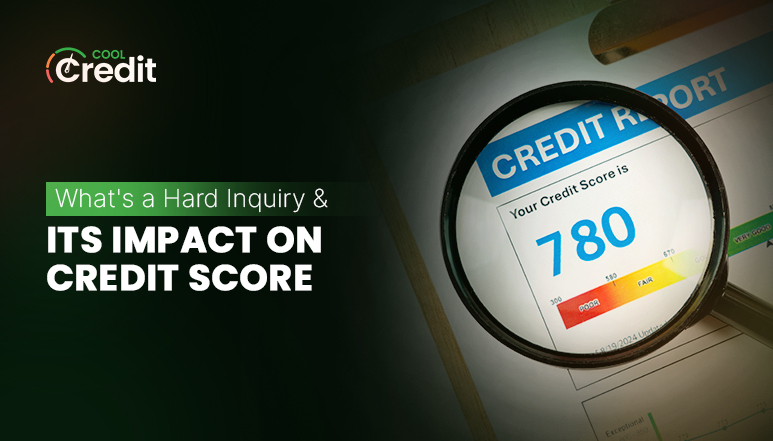
What’s a Hard Inquiry and its Impact on Credit Score
Every time you or someone reviews your credit for a job, a loan, or a promotional offer it leaves an inquiry in your report. These inquiries can change your credit score. But not all inquiries are the same. A hard inquiry happens when you apply for credit, like a loan or credit card. It can temporarily lower your score, and stay in report for 2 years. Too many hard inquiries in a short time may signal financial risk to lenders. However, by managing them wisely, you can avoid unnecessary drops and make informed financial decisions.
In this blog, you’ll learn how hard and soft inquiries work. You’ll also find what triggers them and how they impact your credit score. We’ll also guide you through steps to dispute inaccurate inquiries to protect your credit.
Ready to Transform Your Credit Score? Get Started with Our AI-Driven Credit Repair App
Try NowHard Inquiry Check
Your search for new loans, mortgages, or credit cards leads to a hard inquiry. Potential lenders use hard inquiries to decide whether they should extend credit to you based on your financial history.
Hard pulls are more significant because they directly affect your credit score. These inquiries make up 10% of your FICO score. This means that if you apply for too many credit cards or loans, then it can hurt your score. Also, multiple credit applications in a short time may signal to lenders that you are financially stressed. But when you’re comparing loan rates, all inquiries made within 14–45 days count as one.
A hard inquiry may occur when:
- You apply for credit cards. Each application creates a hard pull on your credit report.
- Your loan applications involve a detailed credit check to assess your ability to repay.
- You request credit limit increases. Even asking to increase your limit may trigger a hard inquiry.
- You are setting up new services. Your utility or phone service providers may perform a hard pull before activating your account.
Soft Inquiry Check
Soft pulls or inquiries happen when your credit is checked without you applying for a loan. These pulls are harmless and do not impact your credit score. But they do show up on your credit report.
These inquiries are used for informational purposes, like assessing your financial responsibility, without initiating credit action. Many companies and institutions make soft inquiries to make credit background checks or promotional offers.
A soft inquiry may occur when:
- Your potential employer runs a background check, which includes reviewing your credit report.
- Companies check your credit to see if you qualify for special or preapproved offers.
- Insurers sometimes review your credit to assess risk before giving you a policy quote.
- You can check your credit report to stay updated on your financial health.
Soft vs Hard Credit Check
Knowing the difference between a soft and hard credit check can help you assess their impact on your score.
| Category | Soft Inquiry | Hard Inquiry |
| What Causes It? | You’re not actively applying for credit. It happens for things like preapproval offers, background checks for jobs, or when you check your credit score. | Happens when you apply for new credit, like a credit card, car loan, or mortgage. Lenders check your report to decide if they’ll approve your request. |
| Examples | Preapproval offers from lenders- Employer background checks- Checking your credit report | Applying for a credit card- Taking out a car loan- Requesting a mortgage |
| Impact on Score | Does not harm your credit score, no matter how often it happens. | May lower your credit score slightly (usually by a few points) for a short time. |
| How Long It Lasts | Stays on your report for up to 2 years. Only you can see it, not lenders. | Visible to lenders for 2 years, but it affects your score only for the first 12 months. |
| Who Can See It? | Only you can view these inquiries. They’re not shared with lenders or other entities. | Lenders can see hard inquiries when they review your credit report for loan approval. |
| Why It Matters? | Helps lenders prequalify you without affecting your credit. It’s a useful tool for personal awareness. | Multiple hard inquiries in a short time may signal risk to lenders. Keep them spaced out to protect your score. |
| How to Limit It? | Soft inquiries happen without your permission but are harmless, so there’s no need to worry. | Limit hard pulls or inquiries by applying for credit only when needed. Research terms and prequalify where possible before applying. |
How Many Hard Inquiries Can Hurt Your Credit Score?
Figuring out how many hard inquiries are too many is not easy. It depends on your credit history and how often you apply for new credit.
One or two hard inquiries in a short time usually won’t hurt your score much. But the more you apply, the bigger the impact. Too many hard pulls can make lenders think you are struggling with money. This can lower your chances of getting approval. In contrast, spacing out your credit applications helps keep your score steady. It also shows lenders that you manage credit wisely.
To protect your credit, apply only when needed and check your credit report regularly. If you see any hard inquiries you don’t recognize, dispute them to keep your score safe.
How To Dispute Inaccurate Hard Inquiries?
Make sure you check and monitor your credit to protect it from inaccurate hard inquiries. Your proactive actions can keep your score and report unharmed.
While monitoring your credit, keep in mind that you have to keep it in check with all major credit bureaus. Lenders can report any bureau, and they can make a hard inquiry on your credit report from TransUnion, Experian, or Equifax. These checks help them get accurate information about your credit history.
You can get your reports from TransUnion, Equifax, and Experian. Once you receive them, examine them for incorrect hard inquiries or other negative remarks.
If you find any mistakes in them, then you can dispute them by following these methods.
Ready for Better Credit? Download AI Credit Repair App and See Results!
Try Now1. Reach Out to Your Lenders
You might find some unfamiliar names on your credit report. Credit card companies or lenders often report under different names. They might use shortened names or the names of their parent companies.
You should review the creditor names on your report carefully. Also, match them to inquiries or accounts you recognize. If you find an unknown name, ask your current lenders if they inquired. They might have made one under a different name. This step can help you confirm if the inquiry is legitimate or incorrect.
2. Contact Creditors Listed on Your Report
If you confirm the hard inquiry doesn’t match any account in your name, then it’s time to reach out to the creditor directly. You can easily find their contact information on your credit report.
With these details, you can make a request to remove the incorrect inquiry. Make sure you keep a record of all your communications with them. Also, it’s recommended that you follow up verbal requests with written communication to ensure your request is documented.
Usually, creditors ask for proof of your identity or address. So keep documents like an ID, utility bill, or bank statement ready. This preparation can help you resolve the issue faster.
3. File a Dispute Letter
If you see an error on your credit reports, you can dispute it directly with the major credit bureaus. But first, try to resolve the issue with the creditor who reported the inaccurate information. If the error is not fixed, you can file a dispute with Equifax, TransUnion, and Experian.
You can write a dispute letter explaining the issue to the bureaus. Ensure you provide proof to support your claim when filing a dispute.
File a dispute letter using this information
| Experian Online: Experian’s dispute online page Mail: Experian, P.O. Box 4500, Allen, TX 75013 Phone: 888-397-3742 Equifax Online: Equifax’s dispute information page Mail: Equifax Information Services, LLC, P.O. Box 740256, Atlanta, GA 30374 Phone: 866-349-5191 TransUnion Online: TransUnion’s disputes page Mail: TransUnion Consumer Solutions, P.O. Box 2000, Chester, PA, 19016 Phone: 800-916-8800 |
Monitor and Boost Your Credit Report With CoolCredit
You should use apps like CoolCredit to stay on top of your credit score. It’s easy and effective. CoolCredit helps you monitor your credit reports regularly. This ensures there are no errors that might hurt your score. The app also assists you dispute any incorrect information on your report. This protects your credit health.
CoolCredit helps you track all inquiries on your report so you can take prompt actions to resolve inaccuracies quickly. You can keep your credit in good shape and avoid unnecessary score drops with this proactive approach.
You can leverage the power of CoolCredit to boost your score. The app helps you set up flexible payment plans to make timely payments. It can boost your credit score, and you can do this multiple times.
Conclusion
Your credit report shows your financial habits and responsibilities. And managing soft and hard inquiries helps you to make better credit decisions. Also regularly monitoring your credit, disputing inaccuracies, and using tools like CoolCredit can help you protect your score. Stay proactive, apply for credit only when necessary, and keep your financial health on track for long-term success.
FAQs
Q: How Long Does It Take Hard Inquiries to Fall off From My Credit Reports?
A: It stays on your report for 2 years but only impacts your credit score for the first 12 months. After that, it becomes visible only as part of your credit history.
Q: How Do I Dispute a Hard Inquiry From My Credit Report?
A: You can dispute it by contacting the creditor who made the inquiry or filing a formal dispute with the credit bureau. Provide proof to speed up the resolution.
Q: Does Checking My Own Credit Report Hurt My Score?
A: No, checking your credit report is a soft pull or inquiry and doesn’t harm your score. It’s a good habit to stay updated on your financial health.
Q: What Should I Do if I See an Unknown Inquiry on My Credit Report?
A: Reach out to the creditor listed to confirm if the inquiry is legitimate. If not, dispute it with the credit bureau to have it removed.
Q: How Can I Avoid Lowering My Credit Score With Hard Inquiries?
A: Apply for credit only when needed, and use prequalification tools before submitting formal applications. Spacing out applications also helps.
Q: Can I See Who Made Soft Inquiries on My Credit Report?
A: Yes, you can see soft inquiries on your report, but they’re only visible to you. Lenders won’t see them, so they don’t impact your creditworthiness.
Q: What’s the Main Difference Between a Soft vs Hard Check?
A: A soft check credit score inquiry doesn’t impact your credit, while a hard check may slightly lower your score and stay on your report for two years.







